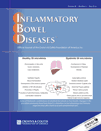Alterations in diversity of the oral microbiome in pediatric inflammatory bowel disease†
Supported in part by a T32 training grant (#5T32DK007477-27) in addition to a Senior Research Award (#1832) from the Crohn's & Colitis Foundation of America and from a grant from the Harvard Institute of Translational Immunology (HITI)/Leona M. and Harry B. Helmsley Charitable Trust Pilot Grants Program.
Abstract
Background:
Oral pathology is a commonly reported extraintestinal manifestation of Crohn's disease (CD). The host–microbe interaction has been implicated in the pathogenesis of inflammatory bowel disease (IBD) in genetically susceptible hosts, yet limited information exists about oral microbes in IBD. We hypothesize that the microbiology of the oral cavity may differ in patients with IBD. Our laboratory has developed a 16S rRNA-based technique known as the Human Oral Microbe Identification Microarray (HOMIM) to study the oral microbiome of children and young adults with IBD.
Methods:
Tongue and buccal mucosal brushings from healthy controls, CD, and ulcerative colitis (UC) patients were analyzed using HOMIM. Shannon Diversity Index (SDI) and Principal Component Analysis (PCA) were employed to compare population and phylum-level changes among our study groups.
Results:
In all, 114 unique subjects from the Children's Hospital Boston were enrolled. Tongue samples from patients with CD showed a significant decrease in overall microbial diversity as compared with the same location in healthy controls (P = 0.015) with significant changes seen in Fusobacteria (P < 0.0002) and Firmicutes (P = 0.022). Tongue samples from patients with UC did not show a significant change in overall microbial diversity as compared with healthy controls (P = 0.418).
Conclusions:
As detected by HOMIM, we found a significant decrease in overall diversity in the oral microbiome of pediatric CD. Considering the proposed microbe–host interaction in IBD, the ease of visualization and direct oral mucosal sampling of the oral cavity, further study of the oral microbiome in IBD is of potential diagnostic and prognostic value. (Inflamm Bowel Dis 2011;)




